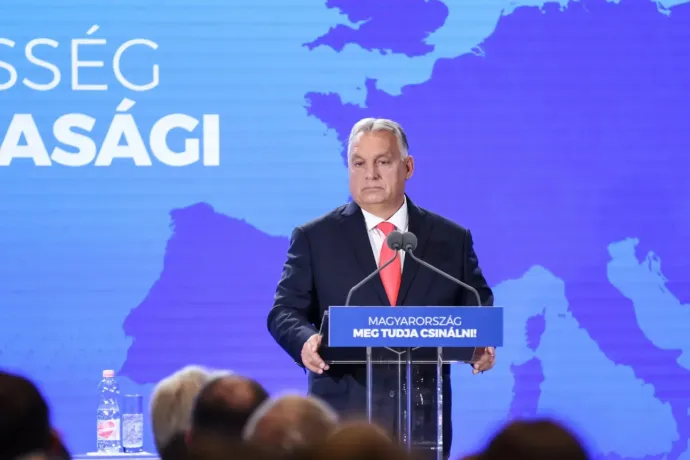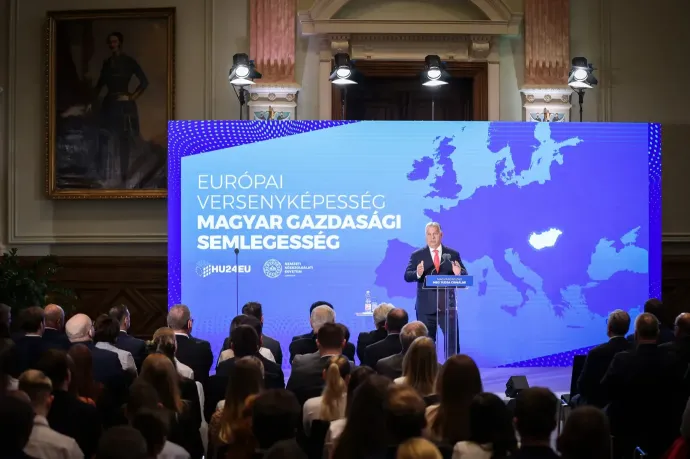
On Wednesday, Hungarian Prime Minister Viktor Orbán said goodbye to his rubber boots that he's been wearing while overseeing the flood defense efforts and went to the National University of Public Service to talk about the fragmentation of the world economy and economic neutrality.
Orbán started by saying that economic neutrality is a more difficult issue than competitiveness, but is one that we are going to hear much about in the near future. He called it a strange construct: we are all familiar with the term “neutrality”, we sometimes use it in politics. He said it makes him think of Austria and Switzerland first, so it is not economic issues that come to mind first, but geopolitical ones. Today, however, his goal is to divert the focus to the economic sphere.
The Prime Minister argued that "we should get to the point of having a pact on competitiveness", but said this was not easy to achieve, because there are obstacles, such as "childish European politicians". Orbán said that if starts to talk about the decline in competitiveness, it is not easy, because in the EU it is not customary to talk about problems, they are a taboo.
The report of a perfect Brusselite
"Although there's no angel coming to our rescue on this, we do have some help: the European Commission asked Mario Draghi, the former head of the European Central Bank, to prepare a report on the decline on competitiveness," Orbán said, adding that he recommends that the university students read it, after all, it was written by "a perfect Brusselite".
He briefly summarized the main statements of Draghi's report, and then pointed out that the report also deals with the battery industry, which Orbán says is "positive from a Hungarian perspective", because the report says there could be a breakthrough in this area, even if EU players won't be the ones to benefit the most from it. As for the car industry, Orbán said it is in crisis because climate policy is being applied without an industrial policy, i.e. the current climate policy is destroying the European industry.
Orbán does not recommend reading the second half of the Draghi report, however, because some parts of it contain solutions, some of which are in line with the Hungarian proposals, but others include federalist solutions.
Asia is the future
After talking about the report, Orbán continued with some of his own thoughts on the matter. He said that Central Bank Governor György Matolcsy told him to "Keep an eye on Asia". Why Asia? Because that's where the future is, where the dynamic is, where the most money is, where the biggest banks, universities, research institutes, innovations and patents are. And Orbán believes that this process cannot be stopped. "These are known things," he said.
But what is the West's response to this? According to Orbán, it is the forming of blocs: trying to separate the Eastern and Western economies, "sometimes with a vehemence and a system of arguments reminiscent of the Iron Curtain. It is a return to Cold War logic. They are trying to revive the twentieth century both in Brussels and in Washington".
And how is the East responding? Orbán says they are working hard to build their own financial plan, to replace dollar-based accounting with an Eastern financial system. He said that they are actually not far from their goal, and when it happens, we will have two financial systems.
And what is the EU doing? According to the Prime Minister, there are two trends. One is the transatlantic trend, where they claim that we should accept that there are half-economies and Europe belongs to the West, so it has to be integrated into the West.
The other position is of those who believe in a strategic autonomy for Europe, where Europe shapes its own path according to its own interests. Orbán said that “for us Hungarians, the second one is more attractive, if only because of our history, but it's a pity that it won't work either".
Orbán is convinced that “a federal Europe is a pipe dream which will be severely shipwrecked.”
Thus, according to the Prime Minister, only a federation of nations can be envisaged. "It is forbidden to use the word ‘nationalism’ in Europe, but ‘patriotism’ is not: there is a shift to patriotism everywhere, and such forces are gaining strength all over: The Netherlands, Italy and France are teetering on the brink," he said. But this idea is still a significant minority in the EU, he said.
According to Orbán, Europe will be ruined if it returns to blocs. "The twentieth century cannot be revived, a new economic policy must be proclaimed," he said, and this is where he arrived at economic neutrality. He said it was up to Budapest to articulate what this was since Brussels is incapable of doing so.
Orbán's plan: economic neutrality
"Is it justifiable for Hungary to be the first? Although it would be a modest thing to wait for others to come up with their sharp insights," Orbán said he believes that this is an issue on which it is justified to be the first to speak out, and that is because Hungary has had an ideology-free economic policy for years.
He brought up the Covid vaccines as an example, and reminded the audience that the Hungarian government was happy to have access to Russian and Chinese vaccines – although the term economic neutrality was not yet known at the time. “One should look at the issue itself, and not from an ideological point of view. We Hungarians are good at that, we are probably the best.”

The point of economic neutrality is that even if the world economy becomes divided into two sides, there will still be meeting points where they can intersect. "This was the case even during the hardest period of the Cold War, just think of Vienna". And both geographically and intellectually, Hungary is in the exact place where this meeting point could be, along with the channels for the flow of money.
According to the Prime Minister, the most important principles of economic neutrality are:
- We decide who we do business with.
- We do business with those with whom it is most profitable.
- We negotiate only based on our own values. (While in the West, for example, things are connected: EU money is tied to ideological issues such as being woke, matters of gender and migrants.)
- We need to be aware of all four corners of the globe.
And what does this economic neutrality consist of? Orbán listed this too:
- Neutrality in financing – we must be present in the financial markets. Not just in London, but also in Qatar and China, and Chinese and Qatari loans are already coming to Hungary;
- Neutrality in investment – we should not be selective when it comes to capital investments coming to Hungary;
- Neutrality in the market – we should sell to whoever is buying;
- Neutrality in technology – On this, Orbán brought up the expansion of the Paks nuclear plant, which he said might look like a Russian investment based on what the newspapers are saying, but it is actually an intercontinental investment, and there are Americans working on it too;
- Neutrality in energy.
"Now that we know what our posture should be, there's only one question left to ask: what is the policy of economic neutrality?"Orbán said, adding that these are still taking shape. Still, he was able to list a few things:
- Growth – the EU is stuck in a 0-3 percent growth range, which the PM said was not enough for Hungary. “We need to get to between 3 and 6 percent, even for the longer term.”
- We mustn't slip back into the slavery of debt – Orbán explained that it is right not to let the IMF “back in”, adding that the public debt must be reduced through a disciplined economic policy.
- We still need external capital – while domestic investors have priority, Hungary cannot move into the 3-6 percent growth range without bringing in more foreign capital.
- Continued tax cuts – this will require a capital injection programme for SMEs, which Minister of Economy Márton Nagy is already working on. They will also be doubling the tax cuts granted to those with children. Work loans for young people not enrolled in university will also be set up.
- New technologies – According to Orbán, Hungary needs to be the place where the car of the future is produced and where the number of digitized documents is the highest. Even a conservative nation should recognise the importance of this and should not shy away from progress.
The PM further said that as the budget is a reflection of policies, elements of the policy of economic neutrality can be expected to feature in the 2025 budget.
If Europe is supposed to develop a policy of economic neutrality, but is unable to do so, will Hungary be able to do it on its own? This is our challenge: to remain neutral in a world beginning to organize itself into blocs. The Prime Minister said that he had asked the ChatGPT about this too, and the ChatGPT gave the following answer: We must not be the victims of a single great power's economic games. Our independence is the cornerstone of the nation's lasting strength. We will build a Hungary where Hungarian actions represent Hungarian interests. Hungary will not bow."
According to Prime Minister Orbán if Hungary is determined, it will be able to achieve economic neutrality.
For more quick, accurate and impartial news from and about Hungary, subscribe to the Telex English newsletter!